INDIAN ARMED FORCES CHIEFS ON OUR RELENTLESS AND FOCUSED PUBLISHING EFFORTS

The insightful articles, inspiring narrations and analytical perspectives presented by the Editorial Team, establish an alluring connect with the reader. My compliments and best wishes to SP Guide Publications.

"Over the past 60 years, the growth of SP Guide Publications has mirrored the rising stature of Indian Navy. Its well-researched and informative magazines on Defence and Aerospace sector have served to shape an educated opinion of our military personnel, policy makers and the public alike. I wish SP's Publication team continued success, fair winds and following seas in all future endeavour!"

Since, its inception in 1964, SP Guide Publications has consistently demonstrated commitment to high-quality journalism in the aerospace and defence sectors, earning a well-deserved reputation as Asia's largest media house in this domain. I wish SP Guide Publications continued success in its pursuit of excellence.
- MoD initiates comprehensive review of Defence Acquisition Procedure 2020, pushes for defence reforms
- G7: The Swansong
- Kalinga Connect: South Asia to Polynesia
- Must Credit DRDO for Operation Sindoor, now what is next for defence R&D?
- The layered Air Defence systems that worked superbly, the key element of Operation Sindoor
- Operation Sindoor | Day 2 DGMOs Briefing
- Operation Sindoor: Resolute yet Restrained
Airborne Exercises along Northern Borders
Amid the heightened tensions with China, along the Line of Actual Control (LAC), the Indian Army conducted airborne exercises to validate rapid response capabilities and seamless integration
 |
The Author is Former Director General of Information Systems and A Special Forces Veteran, Indian Army |
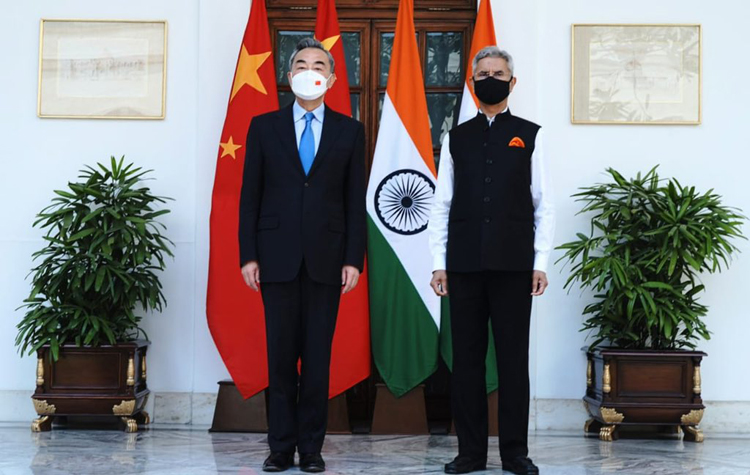
The continuing confrontation with China requires our military to keep honing its skills and be prepared for any eventuality. With the US-led West targeting Russia and having similar designs against China, this is an ideal time for Beijing to resolve its border issues with India through mutual agreement with irrevocable guarantees. But the recent visit by the Chinese Foreign Minister Wang Yi to New Delhi turned out to be a damp squib in this context.
Wang first visited Pakistan where he addressed the OIC meet on Kashmir hosted by Prime Minister Imran Khan, saying, "On the Kashmir issue, we have once again heard the call of many Islamic friends. China shares the same aspiration." Naturally, India slammed Wang for meddling in India's internal affairs but his reference to Kashmir left no doubt that the Chinese Communist Party (CCP) does not want to resolve the border dispute with India. Wang further said that China will "support Pakistan in defending its sovereignty, independence and territorial integrity."
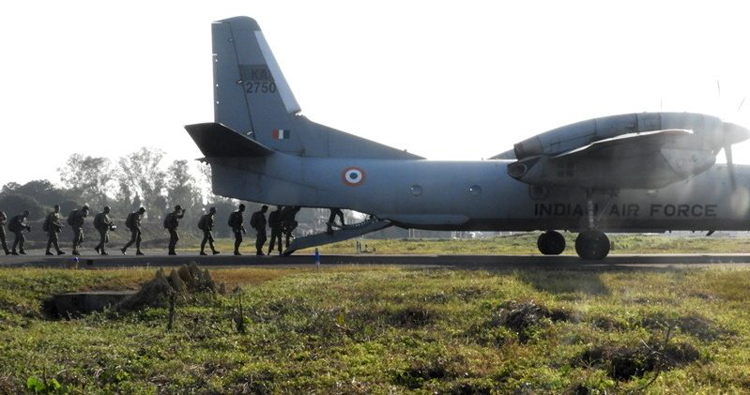
The Chinese ministry of foreign affairs covering Wang's visit to India quoted Wang and said, "Wang Yi said that as mature and rational major developing countries, China and India should place the boundary issue in a proper position in the bilateral relationship, and should not use the definition of the boundary issue to define or even affect the overall development of the bilateral relationship". Not only is China not interested in resolving the border issue, it may be planning another flare up at our borders buoyed by western pussyfooting in Ukraine and North Korea showing two fingers to the US. Besides, China is more than happy if it continues to profit by $100 billion or so annually through bilateral trade with India.
Chinese Foreign Minister Wang Yi addressed the OIC meet on Kashmir and his reference to Kashmir left no doubt that the Chinese Communist Party (CCP) does not want to resolve the border dispute with India
Wang Yi wanted to explore if Prime Minister Narendra Modi would attend the BRICS summit that China is to hold later this year. The summit is being held in-person, not virtually, and Prime Minister Modi not attending it would mean loss of face to China, particularly for Xi Jinping who in the 20th National Congress of the CCP later this year is seeking a third presidential tenure. The forthcoming BRICS summit will naturally discuss the geopolitical situation emerging from the Ukraine crisis, its complexities and global re-alignments. Therefore, Indian participation in the forthcoming BRICS summit is considered essential by China. But External Affairs Minister S. Jaishankar reportedly told Wang Yi that the situation in Eastern Ladakh together with confrontation along the border cannot promote 'business as usual'; these just cannot go together. Wang was also not granted an audience by Prime Minister Modi.
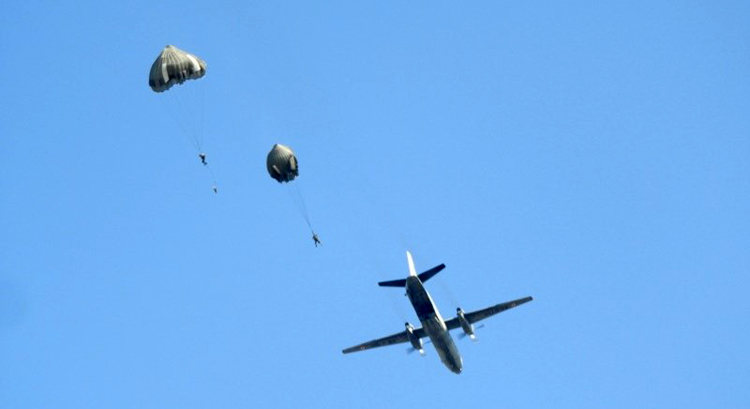
Amid the heightened tensions with China, along the Line of Actual Control (LAC), the Indian Army conducted airborne exercises in November 2021, to carry out airborne insertion in Eastern Ladakh at 14,000 feet. Fully acclimatised troops with specialist vehicles and missile detachments were transported through C-130 and AN-32 aircraft from five different mounting bases to validate inter-theatre move, precision stand-off drops, rapid grouping and the capture of designated objectives with speed and surprise. The exercise also involved combat free-fall jumps and integrated battle drills by airborne forces, mechanised columns and attack helicopters, to validate rapid response capabilities and seamless integration.
Foreign Minister S. Jaishankar reportedly told Chinese Foreign Minister Wang Yi that the situation in Eastern Ladakh together with confrontation along the border cannot promote 'business as usual'. Wang was also not granted an audience by Prime Minister Modi.
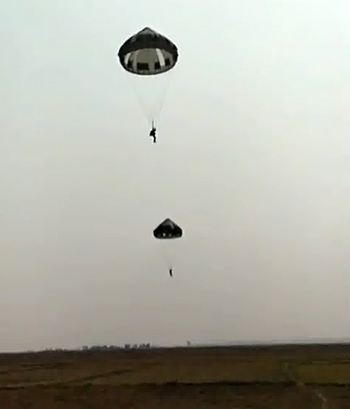
Another exercise was carried out collectively by the Indian Air Force and mechanised forces of the Indian Army, which entailed parachute drops of paratroopers, combat loads, vehicle mounted-anti tank and air defence missile detachments, over a designated target area from C-130 and AN-32 aircraft. Earlier in October 2019, the Army had conducted Exercise 'Him Vijay' to test its new warfighting concept of Integrated Battle Groups (IBG) in mountain warfare under the 17 Mountain Corps in Arunachal Pradesh, which has an offensive role.
In January 2020, the Indian Army conducted Exercise, 'Winged Raider' - a large airborne exercise in the North-Eastern theatre, involving parachuting by over 500 troops, possibly battalion group, from the C-130 Hercules and C-17 Globemaster transport aircraft of the Indian Air Force (IAF) as also using the Army's Dhruv helicopters during the day and night exercise. The Army later said in a statement, "Exercise Winged Raider demonstrated the operational readiness of our Paratroopers and Air Warriors to undertake airborne missions."
Again on March 25, 2022, the Indian Army conducted airborne exercises reportedly in the Siliguri Corridor to test capabilities along our northern borders. The exercise was planned to validate aerial insertion and rapid response entailed airlifting of airborne troops, large scale drops, rapid regrouping, and surveillance of critical targets and capture of objectives. China's continued belligerence has shifted the military's major focus towards our border with China. According to Army Chief Manoj Mukund Naravane, the strategy for India's border with China includes upgrading and building roads in the forward areas, habitats, storage for ammunition and moving some of the advanced weapons systems towards the eastern side.
Indian Army conducted airborne exercises to test capabilities along our northern borders and to validate aerial insertion and rapid response entailed airlifting of airborne troops, large scale drops, rapid regrouping, and surveillance of critical targets and capture of objectives
A cross section believes that future war with China will be hybrid, with China launching massive cyber attacks to target our critical infrastructure, command and control centres, electronic warfare, electromagnetic warfare, use of standoff weapon systems and even use of space, with little scope for conventional warfare. This view is more with the ongoing conflict in Ukraine where the US and allies have pumped in thousands of well armed mercenaries to fight the Russian forces.
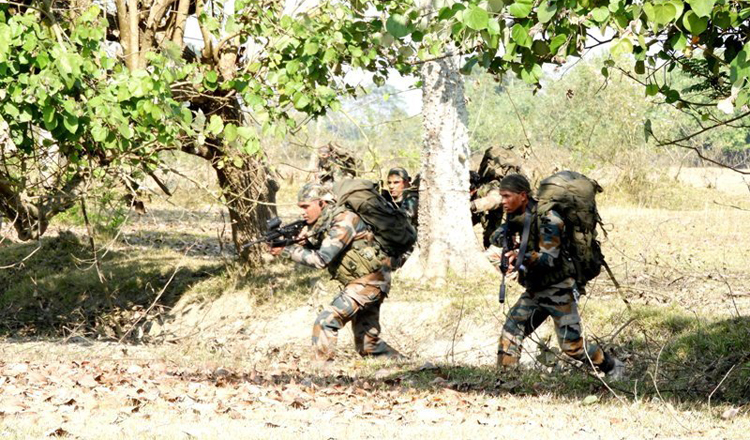
However, hybrid warfare entails interplay of conventional as well as unconventional instruments of power and tools of subversion, which are blended in a synchronised manner to exploit the vulnerabilities of an adversary and achieve synergistic effects. In the case of the CCP, it has an insatiable hunger for territory. Therefore, conventional operations and airborne exercises will continue to play an important role within the gamut of hybrid warfare.





